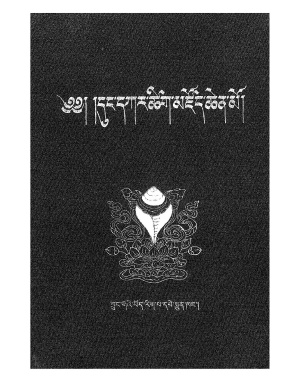Beijing: China Tibetology Publishing House, 2002. — 2388 p. — ISBN
7-80057-540-3.
Наиболее полный толковый словарь тибетологических терминов на
тибетском языке.
这部《东噶藏学大辞典》主要收录了以下几个方面的藏学词汇:关于藏族历史人物与历史事件;关于历代中央王朝与西藏地方政府之间的关系;关于藏族古代法律;关于原西藏地方政府机构及专用公文;关于藏区名胜古迹和重点寺庙;关于藏族民俗与宗教;关于藏学基础知识等方面的词条。编选词汇丰富、内容解释详实、分类科学合理、便于检索使用,是一部较全面的藏学百科性质的辞书。是一部藏学研究人员和藏语文教学工作者及广大读者必备的常用工具书。
A comprehensive Tibetological dictionary compiled by the Professor
Dungkar Lozang Trinlé (1927–1997), a renowned Tibetan scholar, who
started preparation of the dictionary in the early 1960's and
completed in the last day of his life. During the fourty—year
endeavour, the author collected abundant materials from various
sources, selected tens of thousands of important lexical items in
multidisciplinary works of Tibetology, and made detailed
annotations for each entry. Arranged in Tibetan alphabetical order,
the dictionary contains more than 14000 entries with annotations in
2800000 words covering a wide range of basic knowledge of Tibetan
studies, related to philosophy, literature, arts, culture, religion
and sciences, among them the Tibetan history, the relationship
between Tibet and Inland of China, Buddhist philosophy, offical
documents and files, local laws and regelations, ancient temples
and famous monastries, folk customs, Tibetan medicine and
pharmacology serving as the main thread.
Bo in 1927 in the south-easte district of Kongpo, Dungkar
Lozang Trinlé was recognised as the eighth reincaate Rinpoche (or
Lama) of the nearby Dungkar ("White Conch") monastery at the age of
four, and entered the great monastery of Sera shortly after. By the
age of 20, he was appointed disciplinarian at Lhasa's prestigious
Lower Tantric college, and 10 years later in 1957, on the eve of
Tibet's final capitulation, he graduated as a Geshe Lha-ram-pa, the
highest degree in monastic education. He is said to have been able
to memorise every night as many pages of loose-leaf text as could
be pierced with a single needle, and to have developed expertise in
such "lesser sciences" as poetics and astrology, in addition to the
canon of Buddhist philosophy and logic.
In 1958, he was sent to work in higher education in mainland China,
to begin teaching an entire generation of young Tibetan aristocrats
and religious dignitaries: he thus escaped involvement in the 1959
Lhasa uprising and its brutal suppression, but shortly thereafter
he denounced the "old society", gave up his vows and married.
Dungkar's retu to Lhasa in 1983 coincided with the high tide of
Tibetan cultural reconstruction in which he was an important
figure. One of his central aims was realised the following year
with the establishment of "Tibet University", of which he was
appointed vice-principal and professor of history.
Dungkar Lozang Trinlé. Dungkar Tibetological Great Dictionary / Большой толковый словарь Дунгар
Словарь

- формат epub
- размер 173,67 МБ
- добавлен 01 февраля 2015 г.

